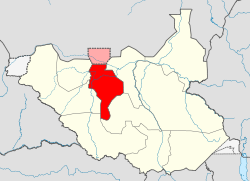Warrap parliament passes $60m 2011/12 budget
November 7, 2012 (JUBA) – The parliament of South Sudan’s of Warrap State voted unanimously to pass a budget amounting to around US$60 million for 2012 and 2013 on Monday, in which capital expenditure has been drastically cut, according to legislators and senior government officials.

“The members voted with true sense of responsibility. They debated the budget from the time it was presented to the passage without unified reservations and constructive observation. The members showed exceptional leadership”, Speaker Deng said on Tuesday.
The budget amounts to 183,071,481 South Sudanese pound (SSP).
Ariec Mayar Ariec, Deputy Chairperson of Information and Public Relations in the Warrap State parliament said Tuesday that most of the budget (150,899,583 SSP) was allocated to pay the salaries of government employees, followed by operational costs (17,039,352 SSP).
The legislator attributed the cut to development spending to austerity measures imposed by the central government in Juba. South Sudan embarked on an austerity programme, since and oil dispute between Sudan and South Sudan, with Juba accusing Khartoum of confiscating oil entitlements worth around US$815m.
This led to South Sudan Juba stopping oil production in January, thus loosing 98% of state revenue just six months in to its independence.
However, after a cooperation deal in September, the transit of South Sudanese crude through Sudan is due to resume in the next few weeks, according to officials in both countries.
Under the African Union-mediated deal, South Sudan will pay between $9.10 and $11.00 for every barrel exported, as well as pay Khartoum $3.08 billion to help Sudan overcome the loss of three quarters of oil production due to South Sudan’s secession in July last year.
South Sudan’s government has pledged that no state salaries will be affected by the shutdown. There have, however, been some instances of salary cuts in some states but the vast majority of cuts have come from development spending.
Dominic Deng Mayom, chairperson of public service committee in the Warrap State Legislative Assembly said the state’s budget had been approved, with a 10% cut in capital expenditure.
Mayom said that the education ministry has been given priority in the budget. Around 27% of South Sudanese are unable to read and write. Following education, health and local government were the priorities for funding, he said.
“The priority area in the budget is education. Because we need to liberate citizens of this state from illiteracy and transform them into skilled human capital for socio-economic development. This can be achieved by promoting equitable access to quality education focusing on combating illiteracy”, Mayom told Sudan Tribune on Tuesday.
James Macok, another member of the state parliament expressed concern over the budget cuts, describing the amount of money which has been allocated for capital expenditure as “negligible”.
He added that this means “there will be no funds to support implementation of the developmental projects.”
(ST)
